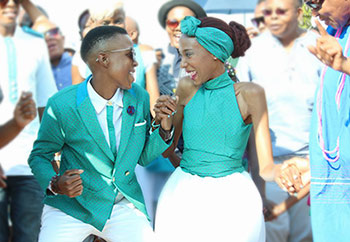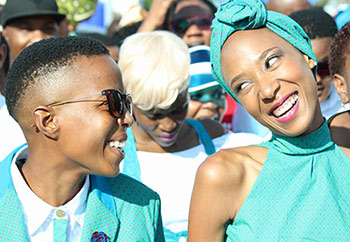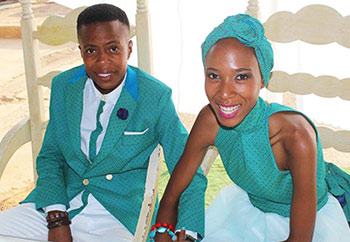follow us
Search this site
| contribute | advertise |
| terms of use |
© 2025 Mambaonline cc
| Lesbian South Africa |
| Lifestyle | News |

Lesbian & Gay Marriage in South Africa: Part 1 – Love & Lobola
01 March 2016

Vaivi & Sape Swartz on their wedding day
Late last year, Vaivi and Sape Swartz, a lesbian couple of almost eight years, made headlines when their marriage became the subject of widespread media coverage, leading to a flood of both public support and sometimes vicious condemnation.
In a two part series, the couple recount how they tied the knot according to traditional customs as well as the humiliating abuse they faced at the hands of government officials at Home Affairs.
In this first article, Vaivi and Sape talk about incorporating the custom of lobola (a payment or gift from the groom’s family to the parents of the bride) into their betrothal, and their Tshwane wedding ceremony in December, surrounded by 280 friends, family and community members.
How did you meet all those years ago? Was there an instant attraction?
Vaivi: It was actually love at first sight. Sape was embarking on the same taxi that I was in and we were instantly attracted to one another. I made a plan to get her contact number and we met again later that evening. I was already out of the closet, but Sape was still in the closet.
Who proposed to who and when? How did it go down?
Vaivi: I proposed to Sape in 2012 over a romantic lunch. I had arranged with the waiter to put the ring in her champagne glass. It was a surprise and she gladly said yes.
Why was getting married important for the two of you?
Sape: We couldn’t imagine our lives without one another. We’ve conquered so many challenges in our lives and our love was the one thing that kept us strong.
Vaivi: After a couple of weeks together we both realised that we’d found our soul mates and we’ve never looked back. Marriage was a big and intimidating step but we just let love lead the way.
Why did you decide to embrace and adapt the lobola tradition?
Sape: It is very important to both of our families. In our traditions, a wedding cannot happen without following the lobola process. We believe that tradition should not exclude us just because we are in a same-sex relationship.
Why does lobola have such significance for you?
Sape: It’s not really about the exchange of gifts or money; it’s about two families coming together. It’s bringing together two ancestral clans… an introduction and way of communicating to the ancestors that there’s a new person in the family. It’s really a binding of the families.
 It’s traditionally a gift from the groom’s family to the bride’s, so how did you decide that Vaivi’s would offer the lobola?
It’s traditionally a gift from the groom’s family to the bride’s, so how did you decide that Vaivi’s would offer the lobola?Vaivi: It wasn’t because of conformity to heteronormativity but because Sape’s family has always had the expectation that she would only leave the Maodi surname after they received lobola. The families were both comfortable with our arrangement and we ensured that in this entire process we were both 100 percent comfortable with what would happen. The goal was for us to be happy and to have a successful traditional ceremony.
Sape: We adapted the customs to a female same-sex relationship and this was purely our choice. Regardless of family expectations it is and should always be the couple’s choice on whether they are willing to challenge traditional norms.
What did the wedding day mean to you?
Sape: We really felt that God was showing off because we had prayed for the day to go well and it went perfectly. The day was the great beginning of the next chapter of our lives together.
What were some of the most memorable moments of the day?
Sape: There were so many, but two stood out. After the exchange of the gifts, Vaivi came to take me officially. My family was embracing her and welcoming her to the clan. It was me saying goodbye to my family and them welcoming Vaivi to the clan. That was one of the best moments of my life. It was sad because my dad was crying but it was mainly tears of joy.
And the second…
Sape: That was when Vaivi’s uncle gave a very meaningful speech to open the event. He said that many people were there to see what was going to happen or were waiting for something bad to happen. He said that the family accepts the LGBT community and that more families must accept their LGBT children and their relationships and not try to change them. Some people cried because their families don’t accept them. It was eye-opening for some of the parents there. It’s not about belittling culture, it’s about culture being progressive…
Why did you decide to go public through the media?
Vaivi: We were approached by the media and we discussed it and decided that this is a great example of culture being progressive, that culture cannot continue to discriminate against us because of sexual orientation. We hoped that our story would encourage not only same-sex couples but also heterosexual couples to some extent.
What kind of response did you get?
Vaivi: There were negative comments from people who did not have a basic understanding of sexuality, who were traditionalists and were homophobic but at the same time there were a lot of messages of encouragement and support and we chose to focus on the positive. The negative were a minority, which indicates some sort of progress in our communities.
Do you think your openness could play a role in growing acceptance for LGBT individuals and family?
Sape: Yes definitely, the positive response from parents who read our article and attended our wedding already demonstrates a shift in the right direction. We do aim to encourage the LGBT community to accept themselves, live positively and for their families to love, support and encourage them.
How important is it to integrate LGBT people and relationships into customs and traditions?
Sape: It is important for the option to be available. Culture has to be adaptable in order for it to be progressive and relevant. If it remains stagnant it will be difficult for the next generations to relate to. It should also be consistent with the law and the Constitution, which does not allow any form of exclusion or discrimination based on sexual orientation.
 Do you plan to raise children?
Do you plan to raise children?Sape: We are already raising two children, our nieces from both sides. One is 14 and in grade 8 and the other is 11, in grade 6. They are well aware of our relationship and they are so mature and informed about it. They always introduce us as their mommies and we love that. We are planning on having another child through artificial insemination.
What advice would you give to other same-sex couples who plan to marry by following local traditions and customs?
Vaivi: They should always include their families from the word go because they are very important in these processes, such as inception, negotiation, exchanging of gifts and traditional requirements.
Sape: They should be united in the decisions they make and always communicate with their partners regularly about the plans and arrangements. Lastly they should remember to be considerate of one another’s feelings; this is a new process which could be complicated but with communication, consideration and love, then all will go well.
Luiz DeBarros


